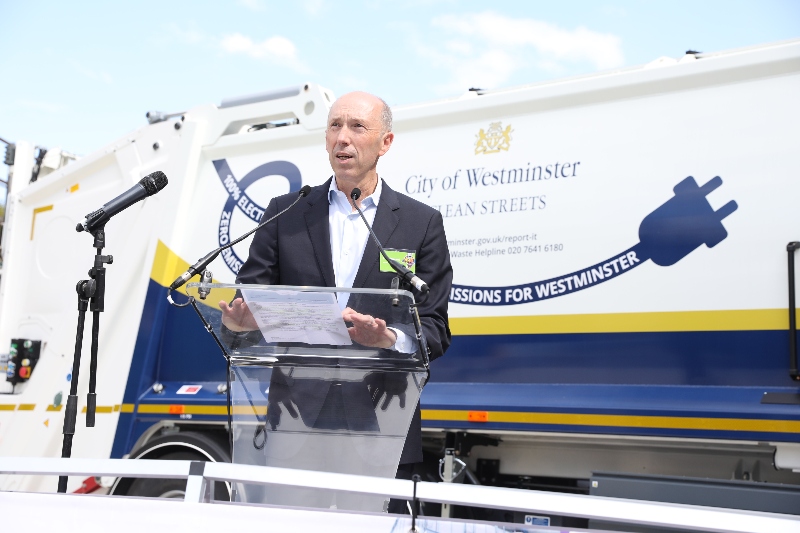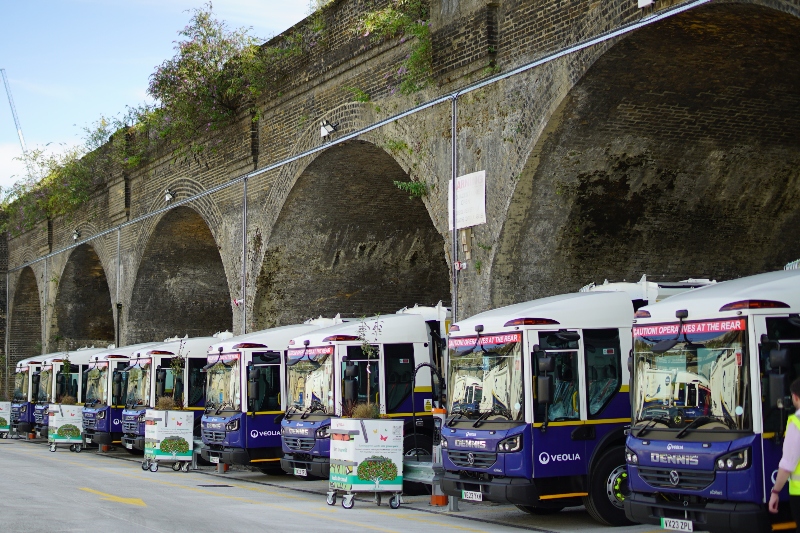

In July, Westminster City Council and waste management experts Veolia announced the rollout of the largest fleet of electric refuse collection vehicles (RCVs) in the UK. In his remarks at the launch event, held at the council’s new depot near Bermondsey, Pascal Hauret, Managing Director Veolia UK Municipal, told the assembled crowd that the project to deliver the new trucks along with the new fully electric depot was unprecedented. ‘The beauty of this project is that there was no rule book,’ he said. ‘We had to start from scratch. Together we wrote that book and God it’s a really good book.’ He then proceeded, with the help of council leader Adam Hug, to plug in a novelty sized plug while the eighties classic ‘Together in Electric Dreams’ blasted out from nearby speakers.
The rollout of the electric RCVs marks a bold step in the long, complex journey of local government fleet decarbonisation. Local authorities are under pressure to tackle climate change and improve the quality of the air we breathe. And so, determined to lead by example, Westminster City Council is gradually transitioning its fleet away from fossil fuels towards electric. To this end, they have invested £20m in procuring 45 brand new, top-of-the-range waste trucks to join the council’s 80-strong truck fleet and the 90 electric street cleaning vehicles, ranging from e-bikes to e-sweepers, already at work in the borough.
Supplied by the Warwick-based manufacturer Dennis Eagle Ltd, the new 26 tonne eCollects will be operated by the council’s environmental partner Veolia and will be required to complete 50 million collections every year. According to Westminster City Council, the new trucks will save up to 89% CO2e each compared to a diesel-powered fleet and will reduce fleet emissions by 50% overall. Put another way, the new eCollects will together save over 2,000 tonnes of CO2 per year.
As Cllr Paul Dimoldenberg, cabinet member for City Management and Air Quality, explains: ‘By replacing diesel-powered refuse trucks with a £20m investment in UK-built electric vehicles, Westminster City Council is voting with its fleet. The trailblazing electrification will deliver an essential service that is quieter for residents [and] improves air quality in central London. This is a significant moment in the evolution of sustainable council services and we look forward to further expanding our zero-emission vehicle fleet in the future.’
Speaking with LAPV after the official launch of the vehicles, Briony Bendle, Veolia Municipal Strategy Manager, said that there was at first ‘a little bit of nervousness’ over whether electric refuse collection vehicles could cope with the intensity of the collections required in the densely populated borough of Westminster. However, when Veolia were testing the eCollects they found the trucks were doing eight to nine hour shifts each day and still returning to the depot with 40% battery left in them. She also praised Dennis Eagle’s willingness to work in partnership with the council and Veolia to ensure that the charging outlets on the vehicles were in exactly the right position for the charge points in the depot.
‘We’ve trialled a few of these vehicles over the past few years and we found for the operations in a city environment they’ve been really good,’ she explained. ‘The drivers’ feedback has been really positive. We have a close working relationship with Dennis Eagle who have really supported us as well.’
 Commenting on the decision by Westminster City Council and Veolia to adopt the eCollect, Dennis Eagle’s Head of Sales and Marketing Richard Taylor said: ‘These zero-emission vehicles will improve air quality in Westminster for everyone who lives, works, or visits there and they will help the council achieve its goal of reaching net zero by 2040. We know how focused Westminster is on sustainability. With that in mind, these eCollects are designed and built in the UK and we are working closely with our suppliers and constantly reassessing our own business to ensure sustainability is at the heart of everything we do.’
Commenting on the decision by Westminster City Council and Veolia to adopt the eCollect, Dennis Eagle’s Head of Sales and Marketing Richard Taylor said: ‘These zero-emission vehicles will improve air quality in Westminster for everyone who lives, works, or visits there and they will help the council achieve its goal of reaching net zero by 2040. We know how focused Westminster is on sustainability. With that in mind, these eCollects are designed and built in the UK and we are working closely with our suppliers and constantly reassessing our own business to ensure sustainability is at the heart of everything we do.’
Having the right infrastructure is key to the successful decarbonisation of a local authority’s fleet. Westminster City Council’s new eCollects are supported by a new fully electric depot in southeast London, which will be capable of charging 54 vehicles simultaneously and – perhaps most interestingly of all – will draw power from the very waste the RCVs collect.
Next door to the Landmann Way depot is the South East London Combined Heat and Power facility (SELCHP). This facility treats residual waste to create 265GWh of electricity, supplying enough to the grid to power 48,000 houses, and generating heat for a local district heating scheme serving over 2,800 homes. Over 50% of the electricity generated by SELCHP qualifies as renewable under the Renewable Energy Guarantees of Origin (REGO) scheme.
It is the energy generated by SELCHP that will charge up the new fleet of eCollects. The facility will provide the Landmann Way site with 3.3GWh of electricity per year via a private wire, which amounts to only about 1% of what the plant produces. Furthermore, thanks to the smart chargers that have been installed on the site, the vehicles will only be charged at non-peak times to maximise local resources and strengthen the resilience of the National Grid.
Pascal Hauret, Managing Director Veolia UK Municipal, commented: ‘Using the waste we collect to power the electric fleet is an exciting innovation because that creates a local loop of energy, using local resources to run local services. I’m incredibly proud of the solutions Veolia and Westminster are pioneering together to build the sustainable municipal services we need, now and in the future.’
In what is another first, the innovative scheme was partly funded by the Mayor of London’s Energy Efficiency Fund (MEEF). Managed by Amber Fund Management Limited, the MEEF provided a £12m loan to Westminster Council, which marks the first time it has financed electric refuse collection vehicles. MEEF’s funding package included senior debt provided by NatWest.
Peter Radford, director of MEEF, Amber Infrastructure commented: ‘We are delighted to work with Westminster and Veolia to support this large scale deployment of electric refuse collection vehicles. We hope that this project will act as a catalyst for other local authorities in the capital to transition their fleets to zero-emission. We look forward to working with Westminster on other innovative projects in the coming months.’
Seb Dance, deputy mayor for Transport, added: ‘I welcome this ambitious plan by Westminster to decarbonise its refuse collection fleet, supported by funding from the Mayor. We need to see more zero-emission vehicles on the capital’s streets in order to tackle the devastating effects of toxic air pollution on Londoners’ health and to meet our ambitious target for London to reach net zero by 2030. Westminster’s new electric refuse collection fleet will not only improve the air in central London but will also benefit residents by reducing vehicle noise. This shows the vital role public-sector funds can play in reaching our net-zero goal, as we build a greener and better London for everyone.’